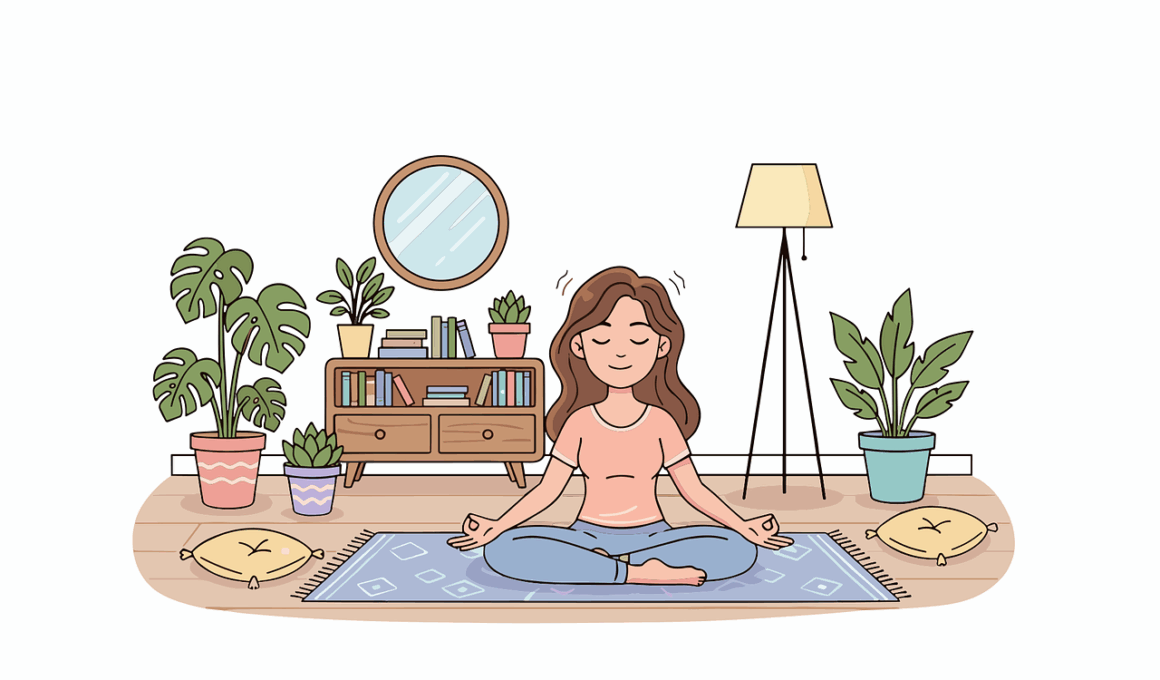Developing a Positive Mindset with Home Workout Practices
Home workouts are not merely about physical fitness; they are equally crucial for developing a positive mindset. Engaging in regular physical activity helps to release endorphins, the body’s natural mood lifters. As you incorporate workouts into your daily routine, you likely experience a notable shift in your emotional state. Feeling accomplished after completing a workout gives you a sense of achievement, which contributes positively to mental health. Moreover, the structured process of a workout can enhance discipline and focus in daily life, translating to enhanced productivity. Additionally, creating a dedicated space for workouts at home fosters an environment of self-care and mindfulness. It allows you to dedicate time to yourself, away from daily stressors, enabling deeper relaxation and meditation. Practicing mindfulness during workouts can amplify the benefits. Concentrate on your breathing, your body movements, and the sensations you experience, promoting a serene mental space. Having an established workout routine also fosters community; many find motivation in online workout classes or social media fitness groups. Thus, workouts at home provide a unique opportunity to positively nurture both body and mind, ultimately forming a balanced and healthy lifestyle.
The Importance of Routine for Mental Clarity
Another vital aspect of home workouts is establishing a consistent routine, which can significantly impact mental clarity. When workouts become a regular part of your day, they introduce a sense of rhythm to your life, providing structure that can be comforting amid uncertainties. Having a schedule can reduce anxiety and help you prioritize your day more effectively, making it easier to achieve work-life balance. Following a set routine encourages discipline, which fosters a productive mindset and boosts mental resilience. It’s essential to personalize your workout schedule, tailoring the timing and types of exercises to suit your mental energy peaks. For instance, if you feel most energetic in the morning, allocate that time for your workout. Even short sessions can drastically enhance your focus and motivation by clearing mental fog. Additionally, waking up early to work out sets a positive tone for the day ahead. Engaging in some form of physical exertion first thing harnesses adrenaline and energy, creating a fulfilling morning experience. Thus, establishing a home workout routine is beneficial for mental clarity and discipline, yielding an overall healthier lifestyle.
Incorporating variety into your home workout routine can elevate motivation and engagement levels. When workouts become monotonous, individuals may lose interest, which can negatively impact both mental and physical health. Exploring different workout types not only keeps the routine exciting but also challenges your body in various ways. For example, mixing strength training with yoga could provide a balance of physical exertion and mental relaxation. Setting specific goals can further enhance motivation—aim for distances, weights, or even trying new types of workouts each week. Experimenting with dance workouts or martial arts can become a joyous pursuit, while activities such as Pilates enhance core stability and strength. By diversifying your exercises, you keep your enthusiasm alive and challenge yourself to grow. Additionally, online fitness platforms offer numerous options that cater to every fitness level and interest. These platforms provide an excellent avenue for discovering new exercises while allowing you to connect with trainers and fellow enthusiasts. Remember that part of developing a positive mindset is maintaining excitement in your fitness journey. Variety is crucial, making every workout feel fresh and inspiring, and bolstering both mental resilience and joy.
The Benefits of Mindfulness During Workouts
Practicing mindfulness during workouts leads to a deeper connection between the body and mind. This practice entails focusing on the present moment, fully engaging your senses to the experience at hand. When meticulously aware of each movement, breath, and thought during your workout, you achieve a meditative state; this fosters inner peace while working on physical fitness. Mindfulness in workouts enhances muscle memory and improves concentration, allowing for better movement execution and injury prevention. Not only does this practice cultivate mental awareness, but it also encourages self-acceptance and body positivity. When workouts become a source of mindfulness, individuals often shift mental narratives from judgment and criticism to appreciation and respect for their bodies. Additionally, utilizing techniques like deep breathing during exercise can help lower stress levels significantly. By focusing solely on your breathing and body movements, you create a safe space to release pent-up emotional stress and anxiety. Hence, integrating mindfulness into your home workouts enhances the psychological benefits you would normally associate with physical exercise, ultimately creating a profound sense of well-being and clarity.
Setting achievable fitness goals plays a vital role in mental health. Goals act as landmarks on your fitness journey, providing motivation and a sense of direction. Individuals often find that when they set measurable and realistic workouts, they tend to stay committed to their routines longer. It’s beneficial to break down larger objectives into smaller, manageable milestones, as this allows you to celebrate your achievements along the way. For example, begin with the aim of completing ten consecutive push-ups before working towards a higher number. Celebrate these small victories, as they contribute positively to self-esteem and a sense of accomplishment. Furthermore, documenting progress in a workout journal can be a fabulous way to visualize efforts and accomplishments. Many individuals discover that keeping track of workouts not only reinforces commitment but also optimistically reflects on growth and development over time. In addition to physical goals, emotional goals can significantly enhance stress resilience. For instance, setting a goal to practice gratitude or self-reflection after every workout can build a positive internal dialogue, transforming the experience. Thus, achievable goals can support a more profound connection between fitness achievements and mental well-being.
Nurturing Social Connections through Home Workouts
Home workouts can also provide an avenue for nurturing social connections, which are crucial for positive mental health. Virtual fitness classes and online workout groups allow individuals to interact with peers who share similar wellness goals. Engaging with others in workout sessions not only creates a sense of belonging but also fosters accountability, encouraging consistent participation. Utilizing social media, you can join communities dedicated to fitness achievements, sharing experiences, workouts, and motivational tips. Having workout buddies, even virtually, builds camaraderie and extracts the loneliness often found in solo workouts. Additionally, many apps enable friends to challenge one another, tracking each other’s progress while encouraging healthy competition. In times of uncertainty or emotional upheaval, these connections can provide critical support systems. The shared experience of working towards fitness goals can strengthen bonds, promote uplifting conversations, and enhance overall happiness. Taking part in livestream classes offers an interactive aspect that enriches the workout experience too, making it lively and engaging. Therefore, fostering social connections through online platforms and communities is vital not just for physical health but also for sustaining positive mental states.
Finally, integrating post-workout reflection can enhance mental well-being while providing insights into your emotional state. After completing a workout, take a few moments to evaluate how you feel, both physically and mentally. This self-reflection develops a greater awareness of your emotions and promotes emotional regulation. Journaling about these feelings can guide you in identifying positive patterns and areas for improvement. You may also consider incorporating relaxation techniques, such as meditation or deep breathing, following your workouts. These practices can facilitate the transition from physical exertion into a state of calm, aiding in stress reduction and mental clarity. Moreover, it’s crucial to recognize that it is perfectly natural for feelings to fluctuate. Reflecting on workouts can help track progress, adapt routines, and identify emotional triggers. Instead of approaching post-workout feelings as merely physical observations, view them as integral aspects of your mental and emotional journey. This holistic approach reinforces your dedication to overall well-being. With time, you’ll promote better emotional resilience, leading to sustained happiness and fulfillment in your fitness journey.


